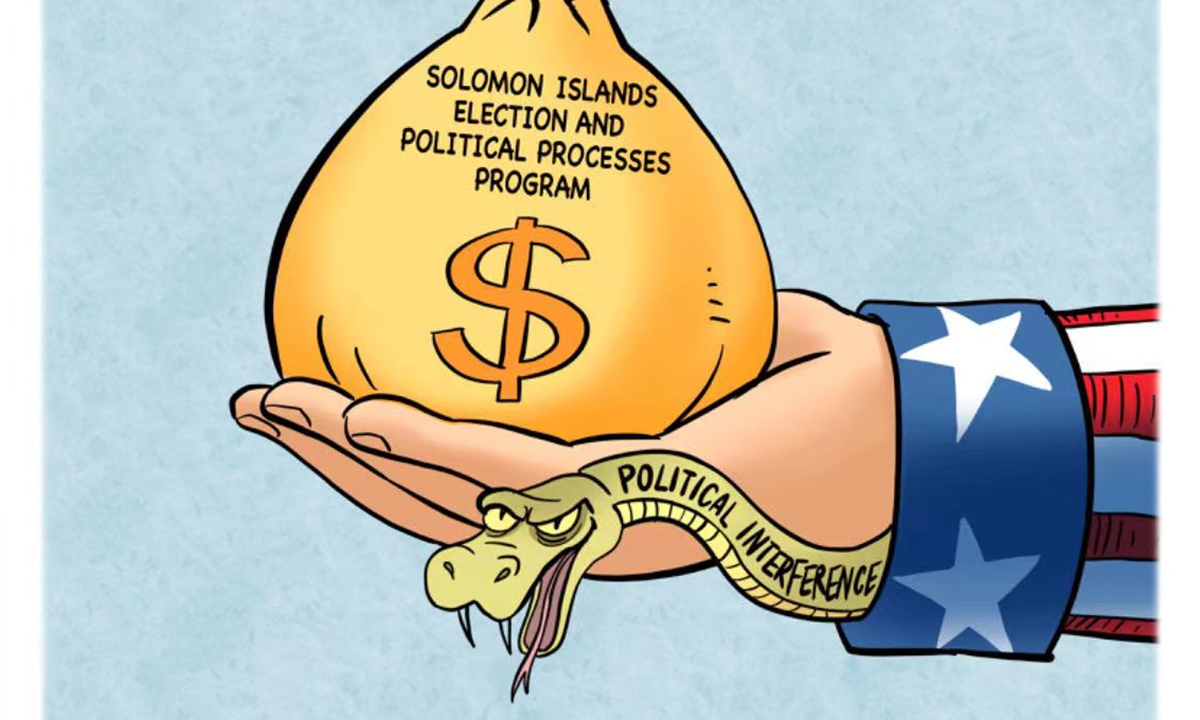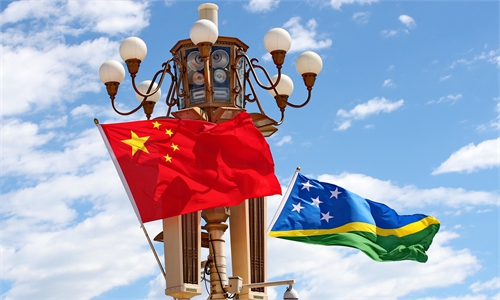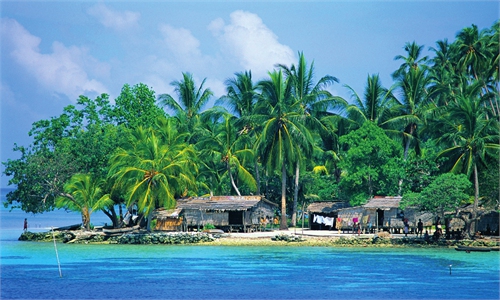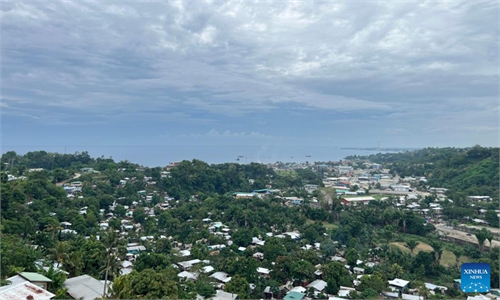Fake news or common practice? Suspicions behind US interference in Solomon Islands election

Illustration: Liu Rui/GT
Voting has closed across the Solomon Islands on Wednesday. About 420,000 registered voters will have their say across 50 national seats in the Parliament, which will later elect the country's prime minister.
This election in the Solomon Islands has attracted widespread international attention, partly because it is the first general election since it established diplomatic ties with China. Against the backdrop of increasing major power games in the South Pacific region, whether its current Prime Minister Manasseh Sogavare can be re-elected is a major test of his foreign policy.
In addition, reports over US interference in the country's election through the US Agency for International Development (USAID) have sparked quite a storm in the public opinion field.
Reports noted that the USAID's Solomon Islands Election and Political Processes Program (SIEPP), funded through the Consortium for Elections and Political Process Strengthening (CEPPS), has conducted voter awareness campaigns in the Solomon Islands, aiming to sway voters toward pro-American candidates. On Monday, the US Embassy to Papua New Guinea, Solomon Islands and Vanuatu issued a statement saying the reports are blatantly misleading claims.
Whether the reports of USAID interference in the Solomon Islands election are true or not, it is an undeniable fact that Western countries, including the US, have long intervened in the political processes, economic policies and diplomatic tendencies of aid-receiving countries through aid. After World War II, developed Western countries provided massive aid to developing countries in Asia, Africa and Latin America, ostensibly to help these countries develop. However, over a long period of time, the aid came with various strings attached, regardless of the recipient country's actual situation and true intentions.
In 2020, shortly after the Solomon Islands established diplomatic relations with China, the US pledged $25 million in aid to Malaita Province, a move interpreted as supporting the latter's independence referendum to potentially secede from the Solomon Islands.
In recent years, ties between China and Pacific Island countries have been growing at an accelerating rate. More and more Pacific Island countries have established or resumed diplomatic relations with China and signed agreements to jointly build the Belt and Road Initiative. Political mutual trust between China and Pacific Island countries is continuously strengthening, and the potential for cooperation in various fields is being explored. Through cooperation, the assistance provided by the Chinese government has significantly improved the well-being of the local people, earning unanimous praise from the islanders.
The positive development trend between China and Pacific Island countries has caused tension among so-called traditional aid countries such as the US and Australia in the West, who believe that China is trying to replace their dominant position in the region. However, the fact is that after the end of World War II, due to the sharp decline in the strategic position of Pacific Island countries, the US abandoned the South Pacific for over half a century, ignoring the slow economic development and weak infrastructure of the Pacific Island countries, tacitly approving Australia and New Zealand's dominant position in the region. As China's cooperation with Pacific Island countries deepens and expands, the South Pacific has once again attracted the attention of the US, but this attention is not due to concern for the development of the island countries, but rather a worry about their own waning influence.
From the "US Strategic Framework for the Indo-Pacific" under the Donald Trump administration to the "Indo-Pacific Strategy of the United States" and "Pacific Partnership Strategy" under the Joe Biden administration, the US continues to increase its aid and diplomatic efforts toward the Pacific Island countries.
The US hosted two consecutive US-Pacific Island Countries Summits in 2022 and 2023, and appointed the first-ever US ambassador to the Pacific Island Forum. The positioning of Pacific Island countries in US foreign strategy is becoming increasingly clear. Increasing investment in Pacific Island countries is an important means for the US to promote the Indo-Pacific Strategy and counter Chinese influence.
Therefore, the public opinion storm over interference in the election reflects the dissatisfaction of Pacific Island countries with the US using aid to exert political influence, and their dissatisfaction with the US using aid as leverage in exchange for its own geopolitical interests. The aid competition promoted by the US in the South Pacific region with a zero-sum game mind-set is forcing Pacific Island countries to take sides, as evidenced by the ongoing troubles in domestic and diplomatic affairs since the Solomon Islands established diplomatic relations with China.
In stark contrast to the US, China emphasizes equality and mutual benefit, non-interference in internal affairs, and aid process without strings attached, respecting the political system, development stage, and development characteristics of Pacific Island countries. As a major power, China never looks down on them, and it is precisely the various advantages of Chinese aid that make China the most trustworthy South-South cooperation partner for Pacific Island countries.
The author is an executive research fellow at the Center for Australia, New Zealand and South Pacific Studies, Chinese Academy of Social Sciences. opinion@globaltimes.com.cn



